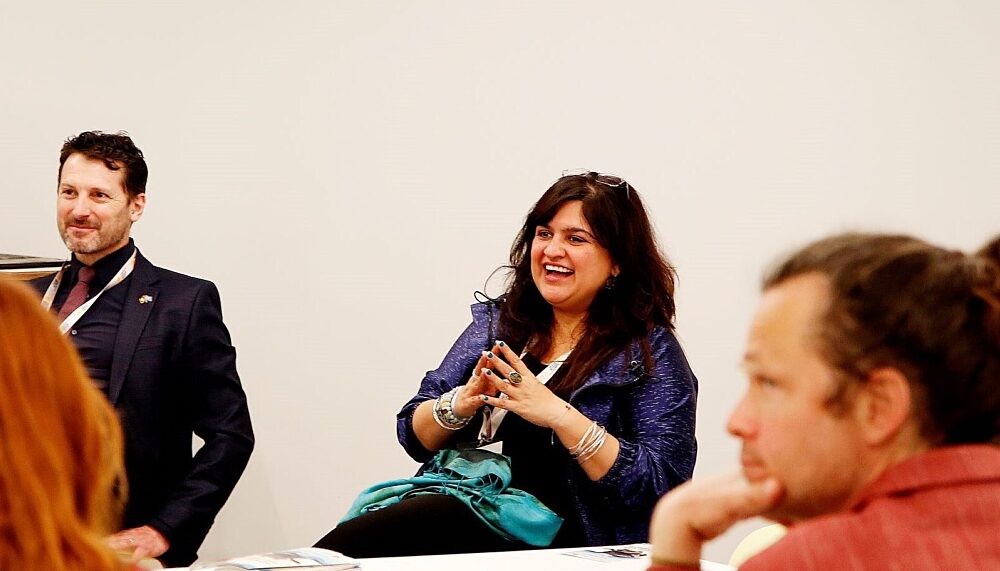FEATURE | 12 Aug 2024
"As global conflicts change, peacebuilders must adapt"
Interview with mediator, negotiator and our new Board Member Neha Sanghrajka

Neha Sanghrajka spoke with us about her career in peacebuilding, including her work on the peace process in Mozambique, and founding a women mediators network.
Berghof Foundation: You were one of two international mediators engaging in negotiations in Mozambique. Tell us about your experience working in the country.
Neha Sanghrajka: Working on the peace process in Mozambique has been a challenging yet rewarding experience. It has been an honour to be allowed into such a sensitive peacebuilding space, working directly with President Filipe Nyusi and leaders of Renamo, the former combatant group which was demobilised as a result of the peace process, the late Afonso Dhlakama and Ossufo Momade.
Every day presented a new challenge but also a new opportunity for me and my fellow mediator Swiss Ambassador Mirko Manzoni, who was later appointed Personal Envoy of the UN Secretary General. We conducted intense shuttle diplomacy, going back and forth between the conflict parties, between the capital Maputo and Renamo's military base in rural Mozambique where we met countless individuals whose lives were affected by the conflict. Listening to their concerns and hopes was pivotal in building trust and confidence in the peace process.
Despite challenges such as leadership changes, climate-related disasters and the COVID-19 pandemic, we successfully signed and implemented a peace agreement. Seeing the process from the early stages of mediation to implementation has been essential to honour the parties’ commitment. I believe that continuity and reliability can have a positive impact on peacebuilding work and I plan to stay committed to the process until its conclusion.
BF: How do you see the prospects for peace in the country?
NS: As with every country, peace can never be taken for granted. I remain optimistic and believe that the nationally-owned gains made thus far are sustainable and will be protected. The term "Peace is Our Culture'' became the core sentiment, if you will, of the process in Mozambique. It’s an approach that includes the whole of society, which embraces both formal and informal institutions in seeking a generalised agreement, including work with schools, with the arts and with religious leaders. I believe this principle will continue to foster and build upon the peace that was achieved. Our mediation efforts emphasised a human-centred approach, addressing cultural nuances, and fostering flexibility. By focusing on listening to people's concerns and adapting to unforeseen challenges, we maintained trust and confidence in the peace process.
BF: Women mediators are often sidelined when it comes to formal peace negotiations. As a woman mediator, can you tell us about the challenges you faced and how you overcame them?
NS: Being a woman in peace negotiations comes with a unique set of challenges. Often, as the youngest and only woman in the room, I was conscious of needing to work extra hard to earn the trust and respect of the parties involved.
In some instances, particularly as I tried to mainstream gender across the process, gender stereotypes could be an obstacle. I focused on building genuine relationships, being humble, and demonstrating my commitment to the peace process. I also made use of the opportunities that being a woman can bring. My presence was not perceived as a threat which opened doors to me. Actively creating more spaces for women at all levels of work on peace is also really important to me, it comes down to practising what is preached and leading by example.
BF: How do you intend to use your expertise to contribute to the Berghof Foundation?
NS: I am honoured to have been invited to join the Board of the Berghof Foundation, I believe that its impact comes from the diversity of experiences and perspectives that it embodies. I hope to offer practical insights from my work in mediation, negotiation and peacebuilding. A standout element of the processes that I have worked on and that I think could be relevant to others, is that I have seen both processes through from inception to end. I learned about the importance of "peace listening" to genuinely understand and address the concerns of those affected by conflict. Building trust through inclusive, human-centred approaches and fostering ownership among local stakeholders aligns with Berghof’s principles of inclusivity and multi-partiality.
BF: What makes you feel hopeful about peacebuilding in the future?
NS: While the field is undergoing shifts such as the rise of new actors, I see this as a welcome opportunity to bridge diverse interests and foster cooperation. There is a richness to be gained from the inclusion of differing voices that can enhance much needed cultural and contextual understanding.
As global conflict dynamics evolve so too must we as peacebuilders. I have been inspired by Berghof’s ability to adapt and respond to emerging global challenges, participating in the recent Berlin Moot conference, which I felt was a gamechanger in our field because of its focus on practical ideas. Innovations like this make me excited to be a part of the future of the organisation. It is this type of proactive, solution-focused outlook that is very much needed at the moment.
Media contact
You can reach the press team at:
+49 (0) 177 7052758
email hidden; JavaScript is required


